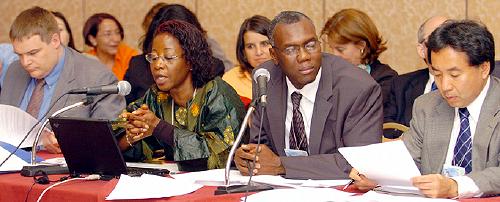
Four New Chemicals Proposed for
Global Blacklist
PUNTA DEL ESTE, Uruguay, May 5, 2005 (ENS) -
Four new chemicals have been proposed for a global ban
at the first meeting of the Parties to the Stockholm
Convention on Persistent Organic Pollutants (POPs) now
underway in Punta del Este. The Convention is an
agreement to eliminate some of the world's most
hazardous substances, and 12 are on the original list.

Henrik Hallgrim Eriksen of Norway addresses
delegates at the First Conference of the Parties to
the Stockholm Convention on Persistent Organic
Pollutants (POPs). (Photo courtesy
Earth
Negotiations Bulletin)
In addition to the 12 chemicals named when the treaty
took effect last May, Norway has nominated the
brominated flame retardant pentabromodiphenyl ether
(penta-BDE) used in foam cushions in home furnishings.
Mexico is nominating a group of chemicals called
hexachlorocyclohexanes (HCH), including the pesticide
lindane, a member of that group.
The European Union is nominating two candidates for
elimination under the treaty - the pesticide
chlordecone, and the brominated flame retardant
hexabromobiphenyl, used in machine housings and radio
and TV parts.
In Punta del Este, more than 600 delegates from 98
countries are taking part in the conference. One of
the delegates' tasks has been to establish a mechanism
for adding new chemicals to the 12 now covered by the
Convention.
Irish Member of the European Parliament (MEP) Avril
Doyle, who heads the group of MEPs in Uruguay this
week said that goal has now been reached. A "key
achievement has been to set up a POPs Review Committee
to assess toxic substances to be added to the
blacklists in the Convention," Doyle said.
The POPs treaty aims to phase out chemicals that
are toxic, persist in the environment, bioaccumulate
through the food web, and cause adverse effects to
human health and the environment. These chemicals
resist normal processes that break down contaminants,
they can travel great distances on wind and water
currents and via trade of goods containing POPs, they
accumulate in the body fat of people and animals and
are passed on from mothers to unborn children.
Colin Church, head of the UK Delegation and acting
president of the EU Delegation, said, "We are very
much aware of the particular difficulties faced by
developing countries who, for example, rely on POPs
for disease and pest control. We fully recognize the
importance of helping them to implement the Convention
effectively.

Colin Church is head of the UK Delegation and
acting president of the EU Delegation (Photo
courtesy ENB)
"A sound financial mechanism will be the key to
ensuring that this support materializes," Church said.
"The EU is the largest contributor to the Global
Environment Facility (GEF), which is the interim
financial mechanism for providing this support, paying
45 percent of the third replenishment."
On Wednesday, the delegates addressed the terms of
reference of the POPs review committee, the
Convention's effectiveness evaluation, national
implementation plans, reporting, technical assistance,
and measures to reduce or eliminate releases from
wastes.
A group of chemicals known as dioxins, produced
unintentionally by manufacturing processes, are on the
list of 12 substances slated for elimination.
Parties to the Convention are required to promote
the use of Best Available Techniques and Best
Environmental Practices (BAT/BEP) to reduce releases
of dioxins.
The draft guidelines on Best Available Techniques
and the provisional guidance on Best Environmental
Practices being considered at the conference are
intended to inform the development of national action
plans, a requirement under the Stockholm Convention.
NGOs generally agree that these guidelines contain
some useful material but that they require further
work before they can be adopted.

The Contact Group on the POPs Review Committee,
chaired by Ibrahima Sow of Senegal (third from left)
reached agreement on size and membership in the
committee. (Photo courtesy ENB)
A global network of public interest NGOs, The
International POPs Elimination Network (IPEN),
released a report in Uruguay Tuesday showing high
levels of POPs in waste incineration residues.
IPEN says that means techniques other than waste
incineration and landfilling of wastes should be
recommended in the BAT/BEP guidelines.
"It also raises the importance of material
substitution," the network said, suggesting, "the
replacement of materials such as PVC [polyvinyl
chloride], a material whose presence in the combustion
processes helps to create more dioxins."
Each country must prepare an inventory of its
dioxin sources and estimates of their releases. A
country will not receive GEF funds for addressing
dioxin sources that are not listed in its inventory.
To help countries assemble their inventories, the
UN Environment Programme (UNEP) developed a draft
Standardized Toolkit for Identification and
Quantification of Dioxin and Furan Releases.
But the NGO network IPEN says this Toolkit does not
cover important by-product POPs such as PCBs and
incompletely addresses calculations of dioxin and
furan releases.
"We recommend that the Parties do not adopt the
Dioxin Toolkit, IPEN said. "It is a flawed document
that poses serious limitations to implementing the
Stockholm Convention. We suggest COP1 call for
substantial revisions, where Parties and stakeholders
need better opportunities to provide input and to
review the results, in order to insure a more
responsive and transparent process."
"BAT/BEP Guidelines should be considered as work in
progress," at the Uruguay meeting, IPEN said.
The delegates' discussion of these guidelines on
Tuesday shows that they are, in fact, a work in
progress. Delegates from industrialized countries
viewed the guidelines differently than those from
developing countries.
Switzerland, Canada, Australia and the EU supported
immediate adoption of the draft guidelines, and, with
Ghana, called for the establishment of a time limited,
open ended working group to continue negotiations, ,
the Earth Negotiations Bulletin reports.
The Philippines, with Egypt and China, called for
further discussions. Observing that developing
countries did not have the resources for immediate
implementation, Egypt and the Gmbia objected to
references to “immediate adoption.”
China emphasized the need for the guidelines to
take into account economic feasibility and, with Yemen
and others, to address the particular situations of
developing countries. Barbados for the Group of Latin
American Consulates (GRULAC), Fiji, Kiribati, and
Mauritius stressed the need for the guidelines to
reflect the constraints facing small island developing
states.
Ecuador for GRULAC, the United States, WWF, and The
International POPs Elimination Network, supported
continued intersessional work. Kenya stressed the need
to address social and economic considerations when
considering the reduction of POPs emissions from
non-industrial sources.

Conference Co-Chair Sergio Vives Pusch of Chile
will help lead further work on the dioxin best
practices guidelines. (Photo courtesy ENB)
The United States suggested that a contact group
develop recommendations for Parties’ use of the
guidelines. All the delegates agreed, and created a
contact group on BAT/BEP led by Conference Co-Chair
Sergio Vives Pusch of Chile and Patrick Finlay of
Canada.
The EU said it acknowledges that further work on
the guidelines is required and has suggested that the
expert group continues its work to complement and
strengthen the draft documents, for adoption at a
future meeting of the Conference of Parties, in
particular addressing the needs and circumstances of
developing countries and regions.
But more talk about elimination of these chemicals
is not enough for Doyle. "We welcome in particular
that work is now in progress to set up a
non-compliance mechanism, which will give teeth to
this Convention so that it is not just a paper tiger,"
Doyle said. "This will be further elaborated at a
special meeting immediately before the second
Conference of the Parties.
The official website of the Stockholm Convention on
Persistent Organic Pollutants is online at:
http://www.pops.int/
For more information on the NGO position, visit
IPEN at:
http://ipen.ecn.cz/index.php?z=&l=en&k=home
Copyright Environment News Service (ENS) 2005. All
Rights Reserved.
http://www.ens-newswire.com/ens/may2005/2005-05-05-04.asp |